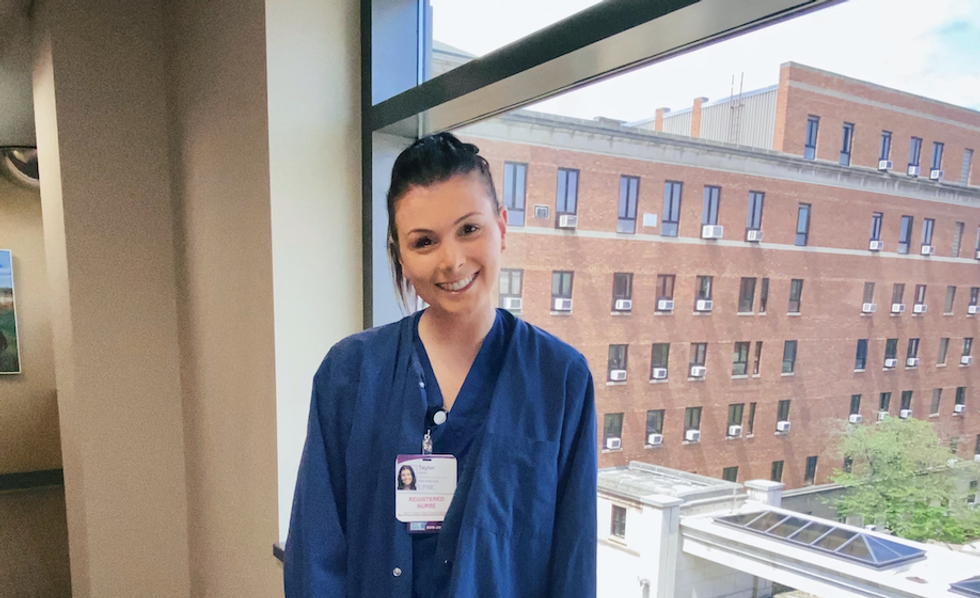It seems like the only thing I do these days is scroll through social media in a desperate attempt to gain information. My phone has called me out on my screen time more than once, and I just continue to ignore it. You're probably in the same boat — stuck at home, scrolling deeper and deeper into a hole of conspiracy theories and possible "back to normalcy" dates, hungry for information.
While we know that the news is not our mental health's friend these days, getting reliable information is helpful and necessary.
While the rest of us are home on our phones, healthcare workers are on the coronavirus (COVID-19) front line every single day. They see what we read snippets of, quickly gaining the perspective that we couldn't fathom. That's why we're going to the root of the information — these healthcare workers who put their own safety at risk every single day.
Today, I sat down (virtually) with Taylor Vlasic, a nurse working in Pittsburgh, Pennsylvania.
How long have you been a nurse?
I've been a nurse for about two years — in Pittsburgh, PA.
What department do you work in?
I am a circulating nurse in the main operating room at my hospital. The main OR has 23 surgical suites and specializes in orthopedic surgery, vascular surgery, general surgery, neurosurgery, surgical oncology, urology, cardiovascular surgery, thoracic surgery, robotic surgery otolaryngology, and plastic surgery.
What's your hospital's procedure in regard to COVID-19 patient care?
My hospital has developed various precautionary procedures during this time. At each of our entrances, there are dedicated staff members to screen incoming patients, visitors, and employees. You are given a mask that is required to wear in the hospital, asked a series of questions related to possible signs, symptoms, and contact with COVID-19. In the operating room, we have a designated room converted to negative pressure for COVID-19 patients. Staff in the room is required to wear a yellow isolation gown, gloves, N-95 mask, and eye protection. We are now also wearing N-95 masks for all thoracic surgery procedures.
What is protocol if you (or another nurse) shows signs of infection?
If a nurse comes in contact with someone COVID-19 positive and/or shows signs and symptoms, they are instructed to call work health and follow their direction.
Do you have enough PPE?
We have a short supply of N-95 masks, required for contact with COVID-19 positive patients and surgical gowns. We are working to make sure we do not open any extra gowns and staff is given one N-95 mask per shift if they are assigned a room with a COVID-19 positive patient, tuberculosis positive patient, or a patient having a thoracic procedure.
What is the biggest change your day-to-day has faced because of COVID-19?
Since the pandemic, the number of surgeries a day has majorly decreased and staff is being downsized on rotation, based on daily needs. Our staff is currently being paid their normal salary, even if they are being downsized.
What is one word that describes your hospital's atmosphere?
Focused.
How do you feel about the national news coverage of COVID-19? Accurate? Downplaying the situation?
Not all news is accurate, but that's not to say that there isn't truth being shared. I believe some news is instilling fear in the public, but for the most part, I do not believe that the news is downplaying this pandemic.
What is one thing you wish you could tell the country about COVID-19?
I wish I could tell the public that social distancing is essential right now. You may not be worried about your health, but we need to think about our vulnerable population and work to protect their health.
How is your personal life impacted by COVID-19?
Due to the pandemic, I have not been able to travel home to Maryland to see my family and spend Easter and my birthday with them this year. We're all just trying to make the best of our current reality and support each other the best we can from a distance.
What advice can you give us for staying as healthy as possible?
Social distancing is very important at this time and also, limiting going out to grocery stores and pharmacies as much as possible. We need to try to keep ourselves healthy by eating well and getting rest during this stressful time.
What can citizens in your area do to help healthcare workers fight COVID-19?
The public can help healthcare workers by staying home and social distancing. Staying out of the hospital if possible is also beneficial at this time. At this time, visitors in the hospital are limited.
If you are a healthcare professional interested in sharing your story, please email lily.moe@theodysseyonline.com.
As an Amazon Affiliate partner, Odyssey may earn a portion of qualifying sales.






















